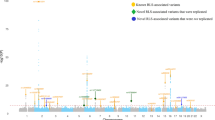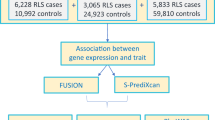Abstract
We identified association of restless legs syndrome (RLS) with PTPRD at 9p23–24 in 2,458 affected individuals and 4,749 controls from Germany, Austria, Czechia and Canada. Two independent SNPs in the 5′ UTR of splice variants expressed predominantly in the central nervous system showed highly significant P values (rs4626664, Pnominal/λ corrected = 5.91 × 10−10, odds ratio (OR) = 1.44; rs1975197, Pnominal/λ corrected = 5.81 × 10−9, OR = 1.31). This work identifies PTPRD as the fourth genome-wide significant locus for RLS.

Similar content being viewed by others
References
Allen, R.P. et al. Sleep Med. 4, 101–119 (2003).
Winkelmann, J. et al. Nat. Genet. 39, 1000–1006 (2007).
Stefansson, H. et al. N. Engl. J. Med. 357, 639–647 (2007).
Vilariño-Güell, C., Farrer, M.J. & Lin, S.C. N. Engl. J. Med. 358, 425–427 (2008).
Winkelmann, J. et al. Mov. Disord. 22(Suppl. 18), S449–S258 (2007).
Ray, A. & Weeks, D.E. Am. J. Hum. Genet. 76, 705–707 (2005).
Chen, S. et al. Am. J. Hum. Genet. 74, 876–885 (2004).
Liebetanz, K.M. et al. Neurology 67, 320–321 (2006).
Kemlink, D. et al. Mov. Disord. 22, 207–212 (2007).
Lohmann-Hedrich, K. et al. Neurology 70, 686–694 (2008).
Bonnen, P.E., Wang, P.J., Kimmel, M., Chakraborty, R. & Nelson, D.L. Genome Res. 12, 1846–1853 (2002).
Uetani, N., Chagnon, M.J., Kennedy, T.E., Iwakura, Y. & Tremblay, M.L. J. Neurosci. 26, 5872–5880 (2006).
Pulido, R., Krueger, N.X., Serra-Pagès, C., Saito, H. & Streuli, M. J. Biol. Chem. 270, 6722–6728 (1995).
Sato, M. et al. Genes Chromosom. Cancer 44, 405–414 (2005).
Nair, P., Depreter, K., Vandesompele, J., Speleman, F. & Stallings, R.L. Genes Chromosom. Cancer 47, 197–202 (2008).
Acknowledgements
We are grateful to all individuals who participated in this study. We wish to thank J. Favor, B. Pütz and K. Oexle for discussions and R. Feldmann, J. Golic, K. Junghans and B. Schmick for technical assistance. We acknowledge L. Habersack, H. Rhese and J. Schmidt-Evers from the German RLS patient organization for supporting this study. Part of this work was financed by the National Genome Research Network (NGFN). The KORA study group consists of H.-E. Wichmann (speaker), R. Holle, J. John, T. Illig, C. Meisinger, A. Peters and their co-workers, who are responsible for the design and conduct of the KORA studies. The KORA research platform (KORA, Cooperative Research in the Region of Augsburg) was initiated and financed by the Helmholtz Zentrum München, which is funded by the German Federal Ministry of Education and Research and by the State of Bavaria. The Canadian part of the study was supported by a Canadian Institutes of Health Research (CIHR) grant to G.R., J.M. and G.T. D.K. was supported by grant MSM0021620849, and J.V. and K.S. were supported by grant MSM0021620816. Recruitment of Czech controls was funded by grant IGA NR 8563-5, Ministry of Health of the Czech Republic.
Author information
Authors and Affiliations
Contributions
Study design: B.M.-M., T.M., J.W. Recruitment and biobanking of RLS cases: C.T., A.Z., K.S.-K., W.O., C.G.B., W. Paulus, B.H., B.F., V.G., W. Poewe, I.P., T.M., J.W. Recruitment and biobanking of KORA controls: C.G., T.I., H.-E.W. Recruitment and biobanking of Canadian RLS cases and controls: L.X., J.M., G.T., G.R. Recruitment and biobanking of Czech RLS cases and controls: D.K., P.V., J.V., K.S., S.N. Affymetrix genotyping: B.S., G.E., P.L. Sequenom genotyping: B.S., D.K., P.L. Supervision of all markers typed: P.L., J.W. Statistical analysis: D.R., S.R., B.M.-M. Clustering of Affymetrix genotypes: D.R., S.R., B.M.-M. Manuscript writing: B.S., D.K., D.R., F.H., B.M.-M., T.M., J.W.
Corresponding authors
Ethics declarations
Competing interests
B.S., P.L. B.M.-M., F.H., T.M. and J.W. filed a patent application (application no. 07007202.0-2401) at the European Patent Office. All other authors have no competing financial interests.
Supplementary information
Supplementary Text and Figures
Supplementary Methods, Supplementary Tables 1–6 (PDF 218 kb)
Rights and permissions
About this article
Cite this article
Schormair, B., Kemlink, D., Roeske, D. et al. PTPRD (protein tyrosine phosphatase receptor type delta) is associated with restless legs syndrome. Nat Genet 40, 946–948 (2008). https://doi.org/10.1038/ng.190
Received:
Accepted:
Published:
Issue Date:
DOI: https://doi.org/10.1038/ng.190
- Springer Nature America, Inc.
This article is cited by
-
Putative Animal Models of Restless Legs Syndrome: A Systematic Review and Evaluation of Their Face and Construct Validity
Neurotherapeutics (2023)
-
Genome-wide analysis identified novel susceptible genes of restless legs syndrome in migraineurs
The Journal of Headache and Pain (2022)
-
Structural basis of liprin-α-promoted LAR-RPTP clustering for modulation of phosphatase activity
Nature Communications (2020)
-
Large genome-wide association study identifies three novel risk variants for restless legs syndrome
Communications Biology (2020)
-
IL1B polymorphism is associated with essential tremor in Chinese population
BMC Neurology (2019)





